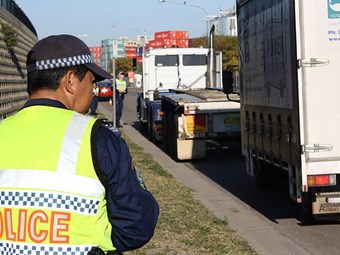Largest Operator Lays Down the Law to Its Sub-Contractors
 One of the largest operators and logistics operators in the country has laid down the law to sub-contractors looking to secure work with the company that they need to meet safety standards and comply with laws.
One of the largest operators and logistics operators in the country has laid down the law to sub-contractors looking to secure work with the company that they need to meet safety standards and comply with laws.
The group’s manager of road transport compliance said sub-contractors would have to do things the company’s way or not at all.
According to the group manager of road transport compliance the company reviews all prospective sub-contractors to determine whether they meet expected standards to operate safely and compliantly.
In a post on Fullyloaded.com.au the manager, Dr Sarah Jones compared the approach to a “pseudo-regulatory stance” because the company is trying to identify dodgy operators similarly to the truck operator licensing system that exists in the UK.
Dr Jones explained:
“Now what I mean by that is we are pulling some of the levers that you might traditionally associate with a regulator. For example, we have a sub-contractor management system that very consciously vets sub-contractors and very consciously says, ‘[if] you do not meet the standard that Toll expects, you do not get to play in our space’,”
Dr Jones explained that the absence of an operator licensing system means the company has to perform the duties you would ordinarily see an accreditor performing.
She was speaking at this year’s Chain of Responsibility and Heavy Vehicle Safety Conference. She explained that if sub-contractors want to do business with the giant operator, they would have to do things the company’s way.
Dr Jones also highlighted the need for stricter roadside enforcement to target unsafe trucking firms and protect compliant operators.
She went on to state:
“I know it sounds counterintuitive to have somebody from industry saying we need enforcement, but we need enforcement because without that we are in a race to the bottom with competitors who care very little for safety and are prepared to cut corners and who compromise our viability in the marketplace. We need enforcement to remain viable,”
Dr Jones also questioned whether current enforcement practices were effective given that chain of responsibility prosecutions were few and far between,
“You have got ask yourself when VicRoads has one investigation ongoing in COR and has never had a successful prosecution for fatigue, how effective is the deterrence?”
“In this context we do need to ask some serious questions around whether deterrence is currently strong enough for those operators that aspire to be safe to remain competitive.”
The company was supportive of the National Heavy Vehicle Regulator (NHVR), believing its promise to improve national Chain of Responsibility enforcement and prosecutions.
She said that while the NHVR spoke about enforcement of CoR and prosecutions during its formation, it fell short on delivering what it promised since it launched the heavy vehicle permit system.
Now the NHVR is “refocusing” its efforts on chain of responsibility. The organisation also hopes a fully functioning national framework will be in operation within the next 2 years.
NHVR manager of COR and regulatory compliance Michael Crellin explained,
“The National Heavy Vehicle Regulator at the moment is trying to develop a truly national COR investigative capability,”
“I’m kind of estimating probably 18 months to two years, but that is not to say that we won’t have that capability before then. It’s probably at the level that we really want it to be at about that time.”
Read more at: http://www.fullyloaded.com.au/industry-news/1512/cor-2015-do-it-our-way-or-not-at-all-toll-tells-sub-contractors/
